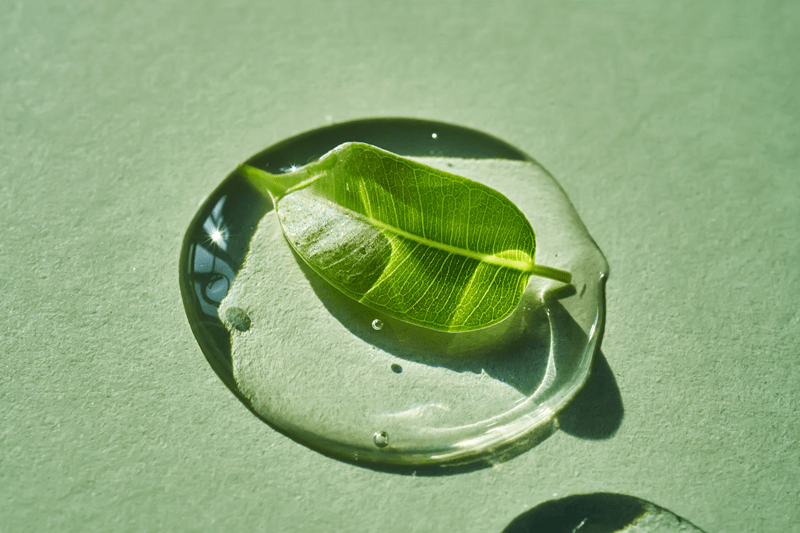
Healthy skin starts with a strong barrier, and ceramides are the key to it. You’ve probably seen “ceramides” listed on moisturizers and serums, but what are they, and why do they matter? Ceramides in skincare help restore lost moisture, strengthen your barrier, and keep your skin smooth and firm. Understanding what are ceramides in skincare gives you the power to choose products that truly protect and repair your skin.
The benefits of ceramides in skincare go beyond hydration, they help prevent long-term damage and support healthy skin renewal. Choosing products with the right ceramide ingredient in skincare ensures lasting protection and visible improvement in texture and tone.
If you're curious about what ceramides are in skincare, imagine them as natural fats or lipids which are present in the outer layer of your skin. The skin cells are held together and moisture is kept inside thanks to ceramides. In other words, ceramides are the glue that keeps your skin soft, smooth, and hydrated.
Ceramides levels decrease with time, the use of harsh cleansers, and sun exposure. A decline in ceramides results in skin losing water and becoming dry, flaky, and irritated. That’s when ceramide-containing skincare products come to the rescue.
Ceramides are often referred to in the ingredient list as Ceramide NP, Ceramide AP, or Ceramide EOP. These terms may look scientific, but all they imply is that the product comprises lipids which are almost identical to what your skin produces. When incorporated as a part of your everyday routine, they provide the skin with repair and reinforcement benefits.
Thus, what is ceramides in skincare doing? It pours into the voids created by the breaking down of your natural lipids, replenishing the balance and conserving your skin from dehydration and environmental stress.
Top pick: Skin Cycling Routine That Everyone’s Talking About
The primary ceramide role in skincare is that of a skin barrier protector. Your skin's topmost layer acts like a wall comprising bricks and mortar. The cells represent the bricks, while the lipids, ceramides included, serve as the mortar. When that mortar is strong, your skin can hold water and block irritants.
Here’s what ceramides actually do:
Once you are aware of ceramide function in skincare, it is easy to see that this ingredient does more than simply moisturize. It backs up your skin's architecture which changes everything from feel to robustness.
Incorporating ceramides into your skincare regimen is a breeze; however, the benefits can transform the skin's sensation and appearance. Let's take a look at the topmost advantages of ceramides in skincare:
Ceramides lock water inside the skin. When the barrier holds tight, moisture stays in place. This means smoother, plumper skin without that dry or stretchy feeling.
A weak barrier allows pollutants and irritants to enter. Ceramides strengthen that barrier so your skin can fight external stress on its own.
Dryness often comes from a broken lipid layer. When you use products with ceramides, they fill those gaps, helping the skin stay nourished and comfortable.
As we age, ceramide production slows down. Skin becomes thinner, and fine lines appear faster. Using ceramide-rich products helps maintain firmness and reduce visible signs of aging by improving moisture retention.
People with eczema, psoriasis, or very dry skin usually have low ceramide levels. Products that restore these lipids can ease irritation and redness, making skin feel more balanced.
The benefits of ceramides in skincare go beyond appearance. They support how your skin functions every day, making it more resilient and self-protective.
Also check: Gentle Cleanser Routine for Fresh, Radiant and Healthy Skin

Not all skincare products contain the same type of ceramide ingredient. Here’s what to know when you pick one.
Most brands use synthetic ceramides that mimic what’s found naturally in your skin. You’ll often see:
Ceramide ingredients appear in moisturizers, cleansers, serums, and body lotions. Creams usually carry the highest concentration because they sit on the skin longer and trap hydration effectively.
Look for formulas that combine ceramides with cholesterol and fatty acids. Together, these rebuild the skin barrier faster. Pairing ceramides with hyaluronic acid or glycerin also helps, as they pull water into the skin while ceramides seal it in.
Avoid products packed with fragrance or alcohol if you have sensitive skin. Ceramides themselves are gentle, but harsh additives can undo their work.
Adding ceramides to your skincare is easy, and you don’t need to overhaul your entire routine. Follow these basic steps:
Everyone can. Whether your skin is oily, dry, or combination, ceramides help it function better. They don’t clog pores, and they work even on acne-prone or reactive skin.
If your skin often feels stripped after cleansing or burns easily when you try new products, that’s a sign your barrier needs help. A ceramide-rich moisturizer can make a big difference.
People living in colder climates or spending long hours in air-conditioned rooms also benefit from ceramides. Both conditions dry out the air and pull moisture from your skin. Ceramides stop that loss.
Most users notice softer skin within a few days of applying a ceramide product. But visible barrier repair usually takes two to four weeks of regular use. Your skin will start holding hydration longer and reacting less to other products.
Stick with it. Ceramides build up in your barrier gradually, and consistency keeps the results lasting.
Explore More: Try These Vitamin C Serum Affordable Picks for Luminous Skin
Ceramides in skincare aren’t just another beauty trend. They’re a vital part of how your skin stays healthy. Knowing what are ceramides in skincare and how they function helps you make smarter choices.
These natural lipids seal in moisture, protect against irritation, and rebuild what your skin loses over time. Whether you’re dealing with dryness, sensitivity, or early aging, ceramides fit easily into any skincare routine.
When you invest in barrier health, your skin rewards you with a steady, calm, hydrated glow. And that’s the real mark of good skincare.
This content was created by AI